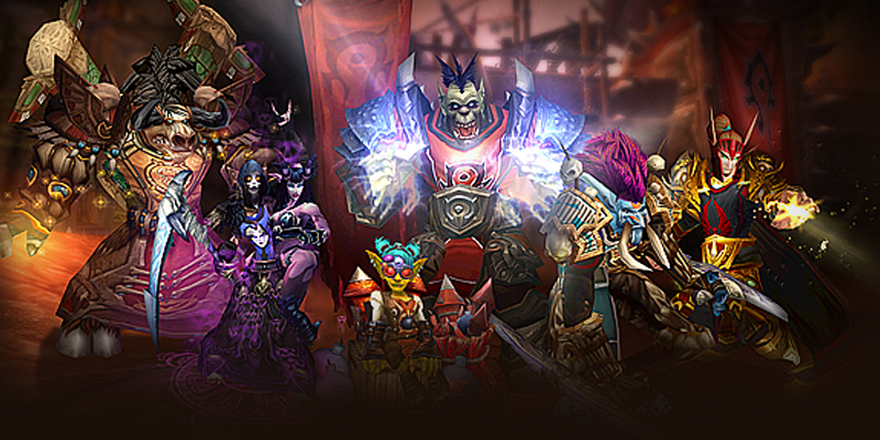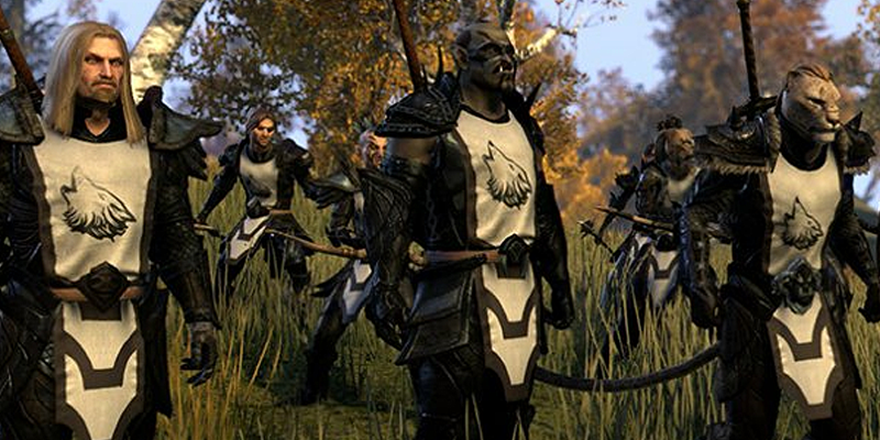
Massively OP Patron Roger has another great question for the crew this week.
“I have the hardest time pushing myself to join a group, but I want to do the dungeons in Guild Wars 2. For the longest time, I wanted a solo mode for the dungeons, or something scalable where it would just be my brother and I delving. I don’t want to hurt people that want to group, but why should their fun supersede my own? I guess, in my opinion, it’s like getting someone to touch a snake that’s afraid of them. Sure, I can force myself to group. I’ve done it in the past. But it’s like a fear I have to suppress first, or basically close my eyes and jump in the deep end by sending out an LFG call. For your game, would you like soloable or scalable modes for group content, or feel some content should be for certain playstyles?”
How do you handle a mild aversion to grouping with strangers in games? How do you feel about soloing and scaling content, and if you were a designer, how would you solve the problem that a lot of MMO players do not want to depend on strangers in order to see basic content? I posed all these questions to the Massively Overthinkers this week!
Andrew Ross (@dengarsw): Assuming you don’t just bring a friend, choose the right genre. I don’t mind grouping with random people, but in survival games, I’ve yet to have a good experience, and the often forced voice chat is often abused so much by angry teens and overly aggressive man-gorillas that I know to avoid them. MOBAs and shooters tend to be the same. MMOs aren’t fully safe, but often, since they’re a bit more permanent, people are actually a bit more polite. Action based can be tough because typing is too hard and people may require voice chat at the high end, but this can also be smart if your fellow puggers don’t need to communicate a lot (but then you’re not doing anything to really get over that aversion, are you?).
Community’s important too. I know this might piss off some RP fans, but if you find a non-RP guild on an RP server, they’ll usually be pretty open (no offense to RPers, I just know that breaking character or being non-RPers can make some of them angry).
I feel like scaling content for solo vs. group play is really hard to do, and I’d rather have the developers spend time on making the game fun rather than fair. I don’t need a massively single player game; getting into a fandom is generally enough for me. When I do multiplayer, I do try to make a connection with the community, even in lobby games.
For myself, if I were to design an MMO, I’d probably use scaleable group content very, very sparingly, and mostly for fluff rewards where something is supposed to feel “epic” in a developer-driven story (like the climax of an expansion, assuming I can’t afford GM driven events).
Brianna Royce (@nbrianna, blog): Every MMORPG needs City of Heroes-quality scaling, and not because some people don’t like grouping but because a lot people do like grouping under reasonable parameters. Scaling makes soloing content viable, sure, but it also makes grouping far more attractive when suddenly your pool of groupmates extends beyond “the random possibly antagonistic people who ground to exactly my iLevel” and becomes “oh hey cool everyone on my friends list no matter his /timeplayed.”
Grouping is not the end-all, be-all of socializing in MMORPGs, but it can be fun when it’s properly designed, even for those of us who groan inwardly at the thought of cold-calling a PUG. The best thing developers can do is accommodate it as part of a range of gameplay for a range of playstyles. Scaling does just that.

Eliot Lefebvre (@Eliot_Lefebvre, blog): If we were still in the days when grouping involved standing in a city begging and waiting for a group, I would still take a dim view of it. Dungeon/group finders alleviate that for me; you have some astonishingly terrible groups, but also some astonishingly good ones, and most of them wind up being very middle-of-the-road. That’s where my own anxiety and irritations more or less start and stop. Take care of the minimum group-forming nonsense necessary, and I’m willing to at least give it a shot. I do know that fear, and it’s something I’ve had to get over through time, partly by reminding myself that probably half of the people in those pools are as wary of me as I am of them.
So much like snake-handling, indeed.
Thus, on the matter of content scaling, I say… yes, please. I am a super huge fan of content scaling. I think that is a very important and good aspect of any game’s design, and I want to see every game include scaling mechanisms for content. I’m happy to use group finders and get into random teams, and I also want the option to just jump into stuff with my wife and a couple of other people if I so desire. The game should scale to people, not the other way around. For that matter, rewards should be greater for smaller groups doing content – in a 25-person raid, your success or failure is 4% of a successful effort. With three people, it’s 33%. You should be rewarded for the effort that you’re putting in!
There are a few ways to handle that sort of scaling; the original Guild Wars and the current Final Fantasy XI both have systems wherein you can supplement your party size with NPC members, which is good insofar as it allows non-scaling content to sort of become scaling. Two people might not be able to take something on, but you can fill out the remainder with NPCs. It’s a kludge, and it works, but I don’t think it’s an ideal solution; a better idea would be a variant on how City of Heroes scaled its missions to work with multiple group sizes. It was a rough kludge in places, but it worked reasonably well.
The biggest thing that this impacts is mechanically intricate bosses; there are lots of bosses in Final Fantasy XIV, for example, that have mechanics based around the party size expected to take on the content. Not that it’s impossible to also make bosses which are mechanically interesting for any size of group, though, with just as much to do (and just as much chance to succeed) with one person instead of eight people. I think there should be space for both on the PvE side of gameplay, allowing people to have content that’s tailored to scale down to solo or up to a reasonable size along with content for groups of varying size. People can form big groups if they can’t clear it in smaller teams, but the content ought not require it.
Of course, that’s also a whole lot of work, so I can understand why it doesn’t happen. Group finders make it at least acceptable, as do dungeons which communicate what players are expected to do (one of my own issues with GW2’s dungeons is the fact that there are lots of “accepted” player strategies that aren’t actually expressed by the content itself, so if no one says what the strategy is you’re often left wondering why everyone is jumping here or what-not). But if I’m going to talk about my actual wishes, I want to be able to just head into a dungeon with my wife, or by myself, or with a bigger group – all with the content scaling to what I feel like doing at the time.
Justin Olivetti (@Sypster, blog): Group finders have been a huge help in me getting over this anxiety of finding people for instances. Now, I practically look forward to running dungeons because I can queue up, do quests while I wait for the dungeon to pop, and the jump in with a group and have some fun.
That said, I totally know where Roger is coming from, and I think that Dungeons & Dragons Online has the best example of a solution here. That was a game that, when initially launched, was nothing but dungeons where grouping was mandatory. If you didn’t want to group, you couldn’t play the game at all. Eventually Turbine listened to players and created several difficulty options for its instances, one of which is to set it to solo. Sure, you’re not going to get great rewards from it, but at least you can run it on your own if you want and play the way you want to play. I think it was a smart move that gave players an option to dip their toes in before jumping into the group experience.

Larry Everett (@Shaddoe, blog): Perhaps I’m the rare exception, but I don’t really have much of an issue grouping up with strangers. I kind of like it sometimes, but I know that I’m probably the exception to the rule. I might have a trick that will work for people who have a bit of an aversion to grouping with people that they don’t know: Group with people do you know. I know that sounds counter-intuitive, but the idea is to start with a known then slowly step into the unknown. It might be as simple as finding one other person you’re comfortable with and group up in LFG with that one person. The majority of your group will be strangers, but you’ll at least have that one person that you know to lean on. And at the same time he or she could lean on you, too.
To the other part of the question: I think that it’s important to have content that doesn’t scale in MMOs. I believe there needs to be some content that can only be accomplished by a group with specific set of abilities. There is a greater sense of accomplishment and personal reward when you get a group that pulls off something that less coordinated players can’t do. That doesn’t mean that I think all content shouldn’t scale. I enjoy some of the content scaling in Guild Wars 2, which was probably my first encounter with good content scaling.
In my primary games, Star Wars: The Old Republic and Elder Scrolls Online, scaling and solo content is extremely important because of the games’ emphasis on storytelling. Both games make the narrative just as important as the gameplay, if not more important. That means, if you cannot do group content there is a huge chunk of narrative that you’re missing. So making solo flashpoints (dungeons) in SWTOR was paramount, and ESO’s level scaling for the new zones like the Gold Coast (Dark Brotherhood DLC) was needed so that everyone could experience the story and not feel that they are missing out on some major plot points. However, if there is a game like WildStar were narrative in group content serves little more than to transition between one complex mechanic to the next more complex mechanic, then it’s less important to make sure that the content scales at all.
Your turn!














